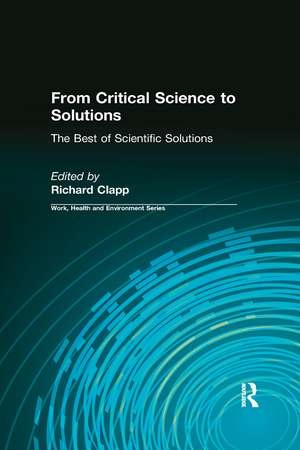From Critical Science to Solutions: The Best of Scientific Solutions: Work, Health and Environment Series
Autor Richard Clappen Limba Engleză Paperback – 15 mai 2012
Din seria Work, Health and Environment Series
- 16%
 Preț: 175.57 lei
Preț: 175.57 lei - 5%
 Preț: 457.73 lei
Preț: 457.73 lei - 5%
 Preț: 453.17 lei
Preț: 453.17 lei - 17%
 Preț: 287.16 lei
Preț: 287.16 lei - 18%
 Preț: 285.83 lei
Preț: 285.83 lei - 13%
 Preț: 301.52 lei
Preț: 301.52 lei - 22%
 Preț: 173.88 lei
Preț: 173.88 lei - 15%
 Preț: 639.28 lei
Preț: 639.28 lei - 18%
 Preț: 721.63 lei
Preț: 721.63 lei - 5%
 Preț: 357.35 lei
Preț: 357.35 lei - 5%
 Preț: 248.63 lei
Preț: 248.63 lei - 5%
 Preț: 396.03 lei
Preț: 396.03 lei -
 Preț: 474.52 lei
Preț: 474.52 lei - 5%
 Preț: 715.79 lei
Preț: 715.79 lei - 5%
 Preț: 298.61 lei
Preț: 298.61 lei - 5%
 Preț: 365.21 lei
Preț: 365.21 lei - 5%
 Preț: 503.23 lei
Preț: 503.23 lei - 18%
 Preț: 946.61 lei
Preț: 946.61 lei - 26%
 Preț: 652.04 lei
Preț: 652.04 lei
Preț: 311.86 lei
Nou
Puncte Express: 468
Preț estimativ în valută:
59.68€ • 62.59$ • 49.68£
59.68€ • 62.59$ • 49.68£
Carte indisponibilă temporar
Doresc să fiu notificat când acest titlu va fi disponibil:
Se trimite...
Preluare comenzi: 021 569.72.76
Specificații
ISBN-13: 9780895034083
ISBN-10: 0895034085
Pagini: 226
Dimensiuni: 152 x 229 mm
Greutate: 0.32 kg
Ediția:1
Editura: Taylor & Francis
Colecția Routledge
Seria Work, Health and Environment Series
Locul publicării:Oxford, United Kingdom
ISBN-10: 0895034085
Pagini: 226
Dimensiuni: 152 x 229 mm
Greutate: 0.32 kg
Ediția:1
Editura: Taylor & Francis
Colecția Routledge
Seria Work, Health and Environment Series
Locul publicării:Oxford, United Kingdom
Public țintă
Professional Practice & DevelopmentCuprins
Section I
CRITICAL SCIENCE
Chapter 1. A Case Study of Pseudo-Science in Occupational Medicine
Sven Ove Hansson
Chapter 2. Endocrine Disruption Comes into Regulatory Focus
Davis Baltz
Chapter 3. The Relevance of Occupational Epidemiology to Radiation Protection Standards
Steve Wing, David Richardson, and Alice Stewart
Chapter 4. Science is Not Sufficient: Irving J. Selikoff and the Asbestos Tragedy
Jock McCulloch and Geoffrey Tweedale
Chapter 5. Silenced Science: Air Pollution Decision-Making at the EPA Threatens Public Health
Kathleen Rest
Section II
PRECAUTIONARY SCIENCE
Chapter 6. PCBs in School—Persistent Chemicals, Persistent Problems
Robert F. Herrick
Chapter 7. Chrysotile Asbestos Exposure: Cancer and Lung Disease Risks
John M. Dement
Chapter 8. Manganese in Gasoline: Are We Repeating History?
Gina M. Solomon, Annette M. Huddle, Ellen K. Silbergeld, and Joseph Herman
Chapter 9. Describing Community Health Risks: Can Epidemiology be Improved?
David Kriebel
Chapter 10. Have Risks Associated with the Presence of Synthetic Organic Contaminants in Land-Applied Sewage Sludges Been Adequately Assessed?
Robert C. Hale and Mark J. La Guardia
Chapter 11. Are We Winning or Losing the War on Cancer? Deciphering the Propaganda of NCI’s 33-Year War
Genevieve K. Howe and Richard W. Clapp
Section III
SOLUTIONS SCIENCE
Chapter 12. What is Yet to Be Done
Barry Commoner
Chapter 13. Good Practice Guidelines for Occupational Health Research Funded by the Private Sector
Margaret Quinn, Charles Levenstein, and Gregory F. DeLaurier
Chapter 14. Factors Influencing Ergonomic Intervention in Construction: Trunkman Case Study
Scott Fulmer, Lenore S. Azaroff, and Susan Moir
Chapter 15. Green Chemistry in California: A Framework for Leadership in Chemicals Policy and Innovation
Michael P. Wilson, Daniel A. Chia, and Bryan C. Ehlers
Chapter 16. The Sustainability Solutions Agenda
Dan Sarewitz, Dick Clapp, Cathy Crumbley, Polly Hoppin, Molly Jacobs, David Kriebel, and Joel Tickner
Meet the Contributors
Index
CRITICAL SCIENCE
Chapter 1. A Case Study of Pseudo-Science in Occupational Medicine
Sven Ove Hansson
Chapter 2. Endocrine Disruption Comes into Regulatory Focus
Davis Baltz
Chapter 3. The Relevance of Occupational Epidemiology to Radiation Protection Standards
Steve Wing, David Richardson, and Alice Stewart
Chapter 4. Science is Not Sufficient: Irving J. Selikoff and the Asbestos Tragedy
Jock McCulloch and Geoffrey Tweedale
Chapter 5. Silenced Science: Air Pollution Decision-Making at the EPA Threatens Public Health
Kathleen Rest
Section II
PRECAUTIONARY SCIENCE
Chapter 6. PCBs in School—Persistent Chemicals, Persistent Problems
Robert F. Herrick
Chapter 7. Chrysotile Asbestos Exposure: Cancer and Lung Disease Risks
John M. Dement
Chapter 8. Manganese in Gasoline: Are We Repeating History?
Gina M. Solomon, Annette M. Huddle, Ellen K. Silbergeld, and Joseph Herman
Chapter 9. Describing Community Health Risks: Can Epidemiology be Improved?
David Kriebel
Chapter 10. Have Risks Associated with the Presence of Synthetic Organic Contaminants in Land-Applied Sewage Sludges Been Adequately Assessed?
Robert C. Hale and Mark J. La Guardia
Chapter 11. Are We Winning or Losing the War on Cancer? Deciphering the Propaganda of NCI’s 33-Year War
Genevieve K. Howe and Richard W. Clapp
Section III
SOLUTIONS SCIENCE
Chapter 12. What is Yet to Be Done
Barry Commoner
Chapter 13. Good Practice Guidelines for Occupational Health Research Funded by the Private Sector
Margaret Quinn, Charles Levenstein, and Gregory F. DeLaurier
Chapter 14. Factors Influencing Ergonomic Intervention in Construction: Trunkman Case Study
Scott Fulmer, Lenore S. Azaroff, and Susan Moir
Chapter 15. Green Chemistry in California: A Framework for Leadership in Chemicals Policy and Innovation
Michael P. Wilson, Daniel A. Chia, and Bryan C. Ehlers
Chapter 16. The Sustainability Solutions Agenda
Dan Sarewitz, Dick Clapp, Cathy Crumbley, Polly Hoppin, Molly Jacobs, David Kriebel, and Joel Tickner
Meet the Contributors
Index
Notă biografică
Richard Clapp Boston University School of Public Health and University of Massachusetts-Lowell.
Descriere
First Published in 2017. Routledge is an imprint of Taylor & Francis, an Informa company.
